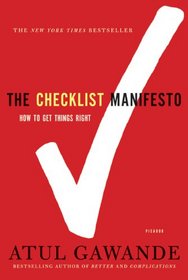Helpful Score: 3
Surgeon-writer Atul Gawande once again produces an educational and entertaining work with The Checklist Manifesto. Although checklists and their uses, especially in aviation, are not a new idea, Gawande breathes new life into the idea that checklists can make a significant difference as he describes his own research and participation in the WHO surgery checklist project. He is a skillful storyteller, framing each chapter in anecdotes that satisfy our curiosity and drives home the point. He again demonstrates his ability to think outside of the box and provides insights on the limitations of checklists. It is definitely a strong call for a change in surgical culture specifically, but also in every field where complexity outstrips individual human expertise.
Helpful Score: 2
This book deals with how simple, clear checklists can improve any complex task. You know: the ones where you have to consider and do a lot of different things and where it is easy to forget some "obvious" task.
I found particularly interesting the observation on how checklists democratize teams, giving more power to subordinates (who can stop an operation, for example, if the surgeon accidentally contaminates his gloves) and how, in cases of unprecedented, complex projects it is better for the top management to simply provide some general guidelines and let the people on the periphery take responsibility, rather than insisting on a strict hierarchy - his example of the emergency responses after hurricane Katrina was enlightening.
Drawing on his experience the author uses mainly examples from medicine, but also from construction and aviation. The statistics he provides that prove his point are astounding.
Even though the subject matter is dry, the book is a very quick and interesting read. I finished it in one day.
I found particularly interesting the observation on how checklists democratize teams, giving more power to subordinates (who can stop an operation, for example, if the surgeon accidentally contaminates his gloves) and how, in cases of unprecedented, complex projects it is better for the top management to simply provide some general guidelines and let the people on the periphery take responsibility, rather than insisting on a strict hierarchy - his example of the emergency responses after hurricane Katrina was enlightening.
Drawing on his experience the author uses mainly examples from medicine, but also from construction and aviation. The statistics he provides that prove his point are astounding.
Even though the subject matter is dry, the book is a very quick and interesting read. I finished it in one day.
Diana N. (learner4life) - , reviewed The Checklist Manifesto: How to Get Things Right on + 58 more book reviews
Helpful Score: 1
This was a pretty good book. It showed me the importance of checklists in every profession you could imagine, including flight, business, surgery, and more. I have personally always tried to work by checklists because I've always known the importance of them. But I just couldn't follow them. I would stay with a checklist for a day or so then quit writing the list. I am not very consistent. This book showed me the importance of keeping a checklist, and not even for record keeping purposes. Simply because it prevents a lot of errors that could be caught by using a checklist in the first place. This is a book focused on medicine and flying airplanes. But throughout the examples you will find bits of information where you see why you should be using a checklist in your own profession. And that includes homemakers as well. I heard a lot about this book before I read it and thought it would have more advice in relation to what I can do to make my checklist. Unfortunately, it does not. It only tells (and just a little bit at that...Unless you're a surgeon or pilot) the benefits of using them.




![header=[] body=[Get a free book credit right now by joining the club and listing 5 books you have and are willing to share with other members!] Help icon](/images/question.gif?v=5fea88b8)
